Complex Nursing Care: Self-Reflection, Clinical Scenarios Analysis
VerifiedAdded on 2023/02/01
|10
|3051
|92
Homework Assignment
AI Summary
This assignment showcases a student's work on complex nursing care, structured in four sections. The first section involves self-reflection, where the student discusses their choice of a graduate nursing program, detailing its features and explaining their personal attributes that align with the program's values. The second section presents a clinical question scenario, focusing on a patient admitted with Malaena, and outlines immediate nursing actions. Section three addresses prioritization, where the student evaluates four different patient scenarios, ranking them according to urgency and need for intervention. The final section delves into a professional scenario involving medication review, specifically addressing the patient's use of Warfarin, NSAIDs, and Aspirin, and the potential risks associated with this combination. The assignment demonstrates the student's understanding of clinical scenarios, prioritization, and professional responsibilities in nursing care.
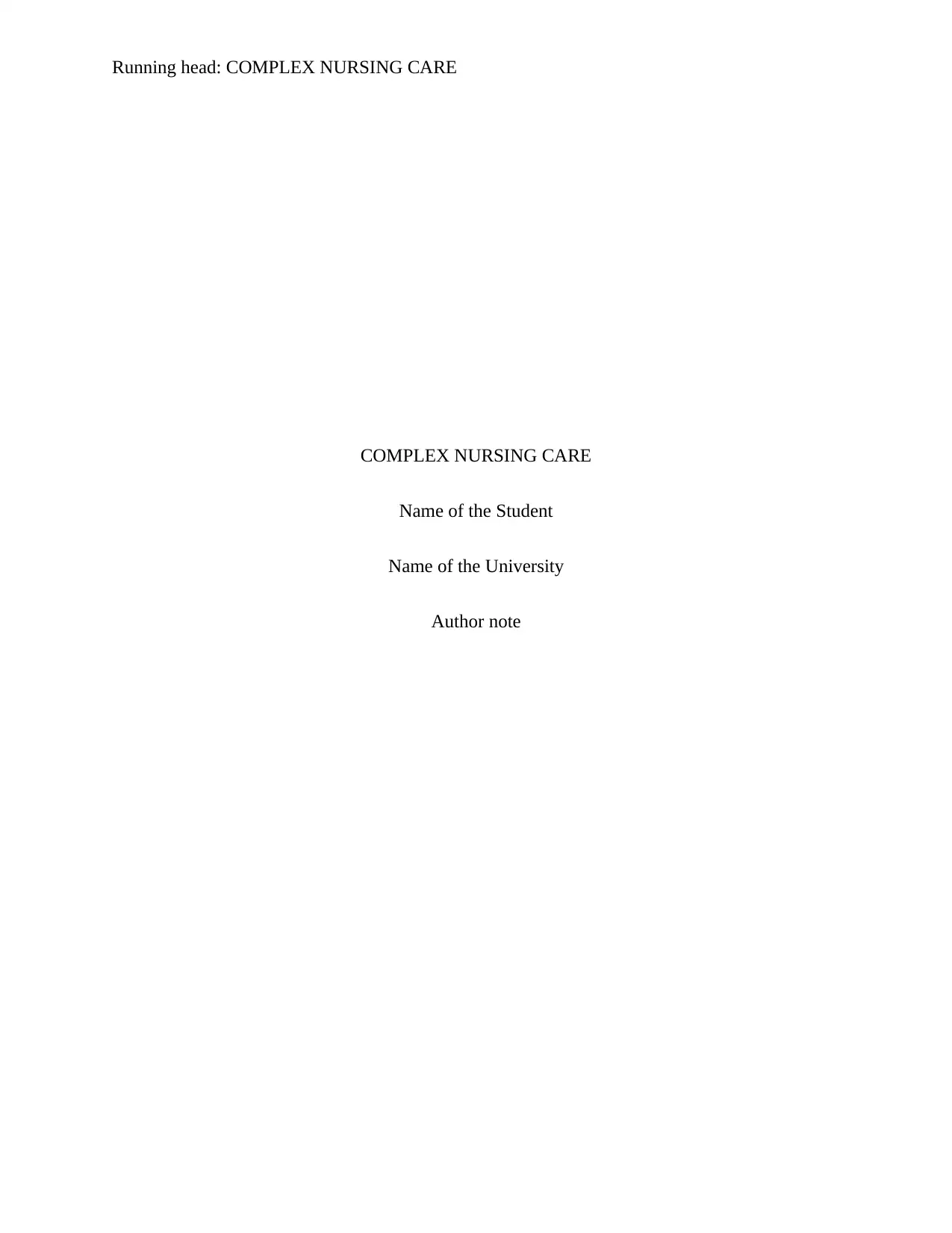
Running head: COMPLEX NURSING CARE
COMPLEX NURSING CARE
Name of the Student
Name of the University
Author note
COMPLEX NURSING CARE
Name of the Student
Name of the University
Author note
Paraphrase This Document
Need a fresh take? Get an instant paraphrase of this document with our AI Paraphraser
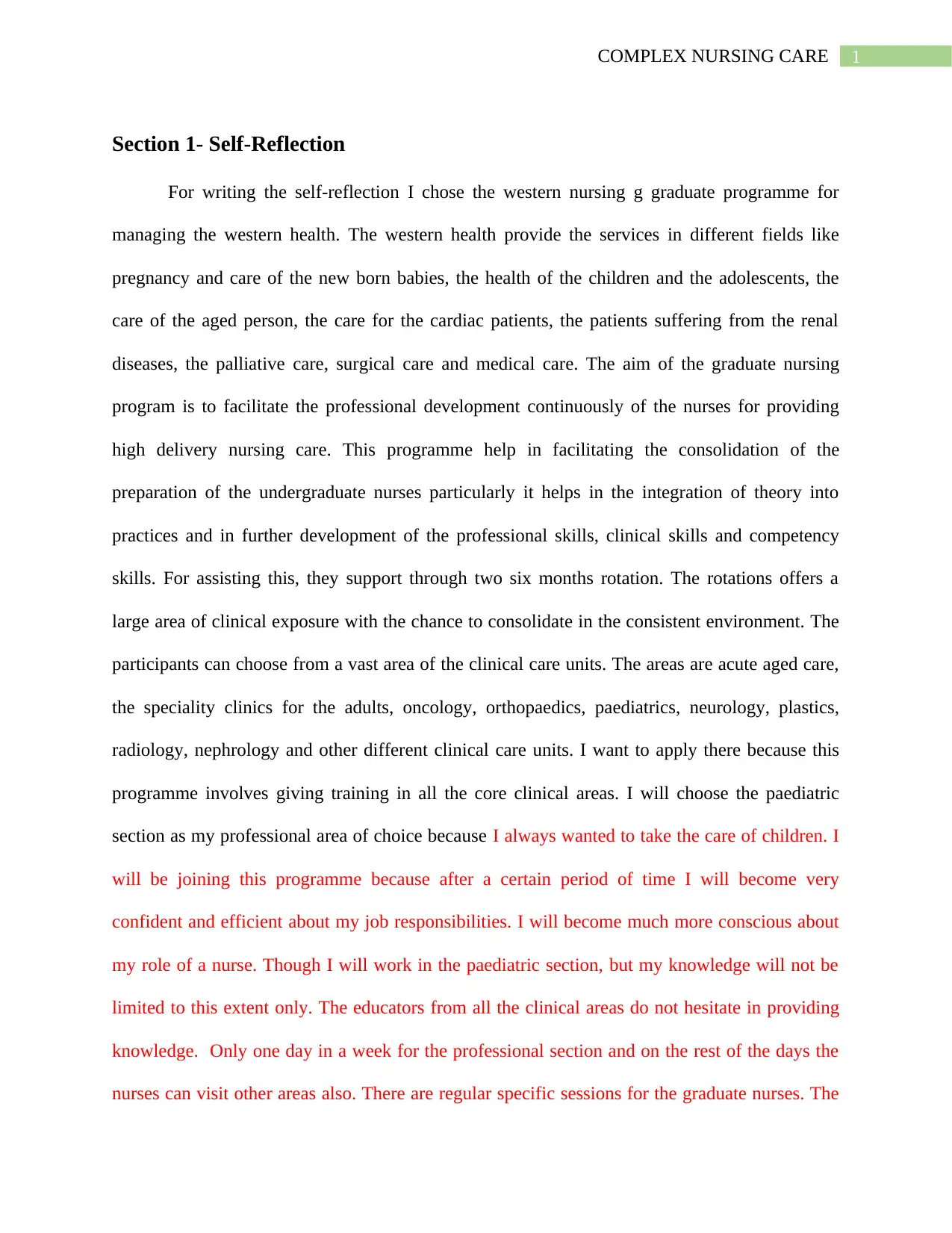
1COMPLEX NURSING CARE
Section 1- Self-Reflection
For writing the self-reflection I chose the western nursing g graduate programme for
managing the western health. The western health provide the services in different fields like
pregnancy and care of the new born babies, the health of the children and the adolescents, the
care of the aged person, the care for the cardiac patients, the patients suffering from the renal
diseases, the palliative care, surgical care and medical care. The aim of the graduate nursing
program is to facilitate the professional development continuously of the nurses for providing
high delivery nursing care. This programme help in facilitating the consolidation of the
preparation of the undergraduate nurses particularly it helps in the integration of theory into
practices and in further development of the professional skills, clinical skills and competency
skills. For assisting this, they support through two six months rotation. The rotations offers a
large area of clinical exposure with the chance to consolidate in the consistent environment. The
participants can choose from a vast area of the clinical care units. The areas are acute aged care,
the speciality clinics for the adults, oncology, orthopaedics, paediatrics, neurology, plastics,
radiology, nephrology and other different clinical care units. I want to apply there because this
programme involves giving training in all the core clinical areas. I will choose the paediatric
section as my professional area of choice because I always wanted to take the care of children. I
will be joining this programme because after a certain period of time I will become very
confident and efficient about my job responsibilities. I will become much more conscious about
my role of a nurse. Though I will work in the paediatric section, but my knowledge will not be
limited to this extent only. The educators from all the clinical areas do not hesitate in providing
knowledge. Only one day in a week for the professional section and on the rest of the days the
nurses can visit other areas also. There are regular specific sessions for the graduate nurses. The
Section 1- Self-Reflection
For writing the self-reflection I chose the western nursing g graduate programme for
managing the western health. The western health provide the services in different fields like
pregnancy and care of the new born babies, the health of the children and the adolescents, the
care of the aged person, the care for the cardiac patients, the patients suffering from the renal
diseases, the palliative care, surgical care and medical care. The aim of the graduate nursing
program is to facilitate the professional development continuously of the nurses for providing
high delivery nursing care. This programme help in facilitating the consolidation of the
preparation of the undergraduate nurses particularly it helps in the integration of theory into
practices and in further development of the professional skills, clinical skills and competency
skills. For assisting this, they support through two six months rotation. The rotations offers a
large area of clinical exposure with the chance to consolidate in the consistent environment. The
participants can choose from a vast area of the clinical care units. The areas are acute aged care,
the speciality clinics for the adults, oncology, orthopaedics, paediatrics, neurology, plastics,
radiology, nephrology and other different clinical care units. I want to apply there because this
programme involves giving training in all the core clinical areas. I will choose the paediatric
section as my professional area of choice because I always wanted to take the care of children. I
will be joining this programme because after a certain period of time I will become very
confident and efficient about my job responsibilities. I will become much more conscious about
my role of a nurse. Though I will work in the paediatric section, but my knowledge will not be
limited to this extent only. The educators from all the clinical areas do not hesitate in providing
knowledge. Only one day in a week for the professional section and on the rest of the days the
nurses can visit other areas also. There are regular specific sessions for the graduate nurses. The
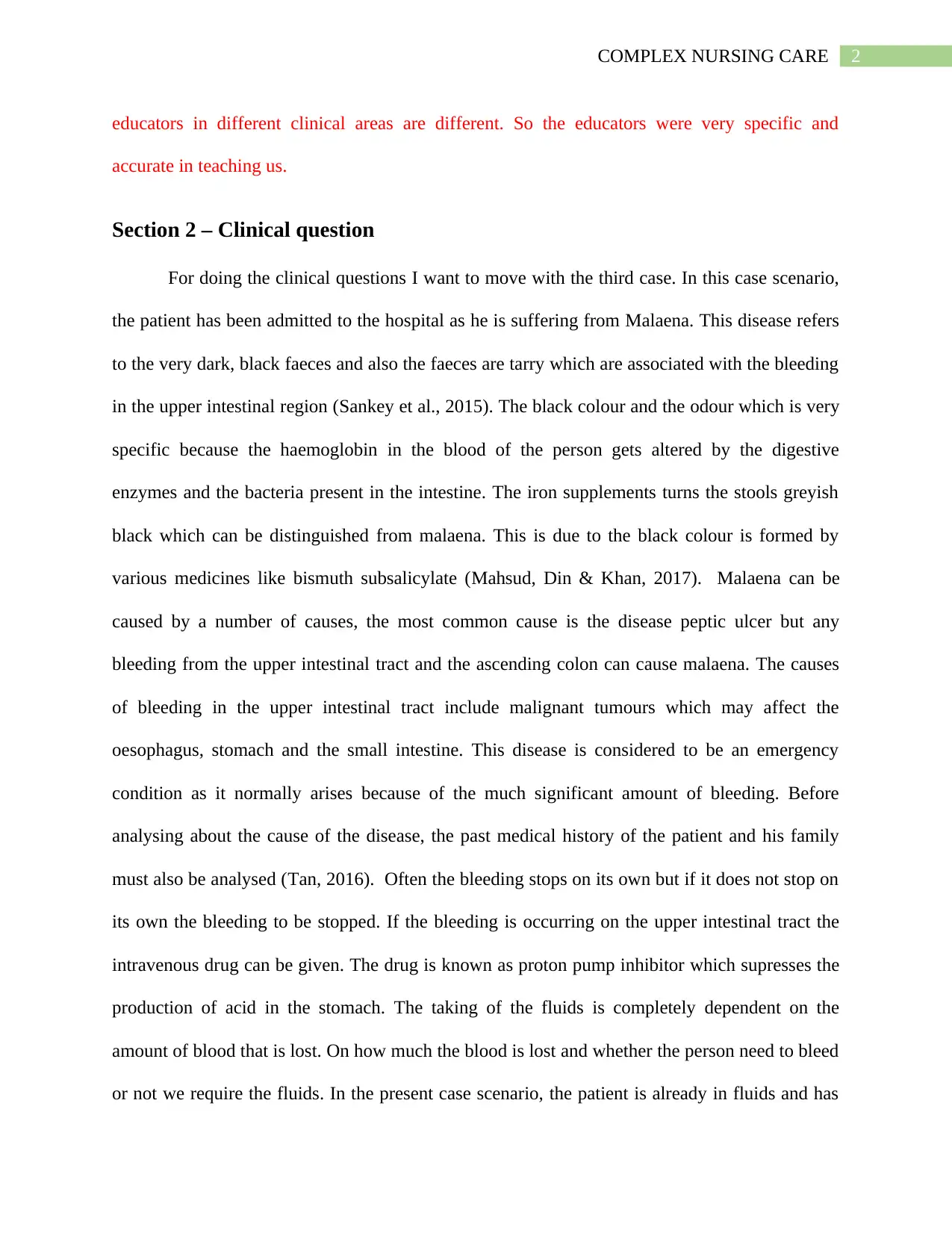
2COMPLEX NURSING CARE
educators in different clinical areas are different. So the educators were very specific and
accurate in teaching us.
Section 2 – Clinical question
For doing the clinical questions I want to move with the third case. In this case scenario,
the patient has been admitted to the hospital as he is suffering from Malaena. This disease refers
to the very dark, black faeces and also the faeces are tarry which are associated with the bleeding
in the upper intestinal region (Sankey et al., 2015). The black colour and the odour which is very
specific because the haemoglobin in the blood of the person gets altered by the digestive
enzymes and the bacteria present in the intestine. The iron supplements turns the stools greyish
black which can be distinguished from malaena. This is due to the black colour is formed by
various medicines like bismuth subsalicylate (Mahsud, Din & Khan, 2017). Malaena can be
caused by a number of causes, the most common cause is the disease peptic ulcer but any
bleeding from the upper intestinal tract and the ascending colon can cause malaena. The causes
of bleeding in the upper intestinal tract include malignant tumours which may affect the
oesophagus, stomach and the small intestine. This disease is considered to be an emergency
condition as it normally arises because of the much significant amount of bleeding. Before
analysing about the cause of the disease, the past medical history of the patient and his family
must also be analysed (Tan, 2016). Often the bleeding stops on its own but if it does not stop on
its own the bleeding to be stopped. If the bleeding is occurring on the upper intestinal tract the
intravenous drug can be given. The drug is known as proton pump inhibitor which supresses the
production of acid in the stomach. The taking of the fluids is completely dependent on the
amount of blood that is lost. On how much the blood is lost and whether the person need to bleed
or not we require the fluids. In the present case scenario, the patient is already in fluids and has
educators in different clinical areas are different. So the educators were very specific and
accurate in teaching us.
Section 2 – Clinical question
For doing the clinical questions I want to move with the third case. In this case scenario,
the patient has been admitted to the hospital as he is suffering from Malaena. This disease refers
to the very dark, black faeces and also the faeces are tarry which are associated with the bleeding
in the upper intestinal region (Sankey et al., 2015). The black colour and the odour which is very
specific because the haemoglobin in the blood of the person gets altered by the digestive
enzymes and the bacteria present in the intestine. The iron supplements turns the stools greyish
black which can be distinguished from malaena. This is due to the black colour is formed by
various medicines like bismuth subsalicylate (Mahsud, Din & Khan, 2017). Malaena can be
caused by a number of causes, the most common cause is the disease peptic ulcer but any
bleeding from the upper intestinal tract and the ascending colon can cause malaena. The causes
of bleeding in the upper intestinal tract include malignant tumours which may affect the
oesophagus, stomach and the small intestine. This disease is considered to be an emergency
condition as it normally arises because of the much significant amount of bleeding. Before
analysing about the cause of the disease, the past medical history of the patient and his family
must also be analysed (Tan, 2016). Often the bleeding stops on its own but if it does not stop on
its own the bleeding to be stopped. If the bleeding is occurring on the upper intestinal tract the
intravenous drug can be given. The drug is known as proton pump inhibitor which supresses the
production of acid in the stomach. The taking of the fluids is completely dependent on the
amount of blood that is lost. On how much the blood is lost and whether the person need to bleed
or not we require the fluids. In the present case scenario, the patient is already in fluids and has
⊘ This is a preview!⊘
Do you want full access?
Subscribe today to unlock all pages.

Trusted by 1+ million students worldwide
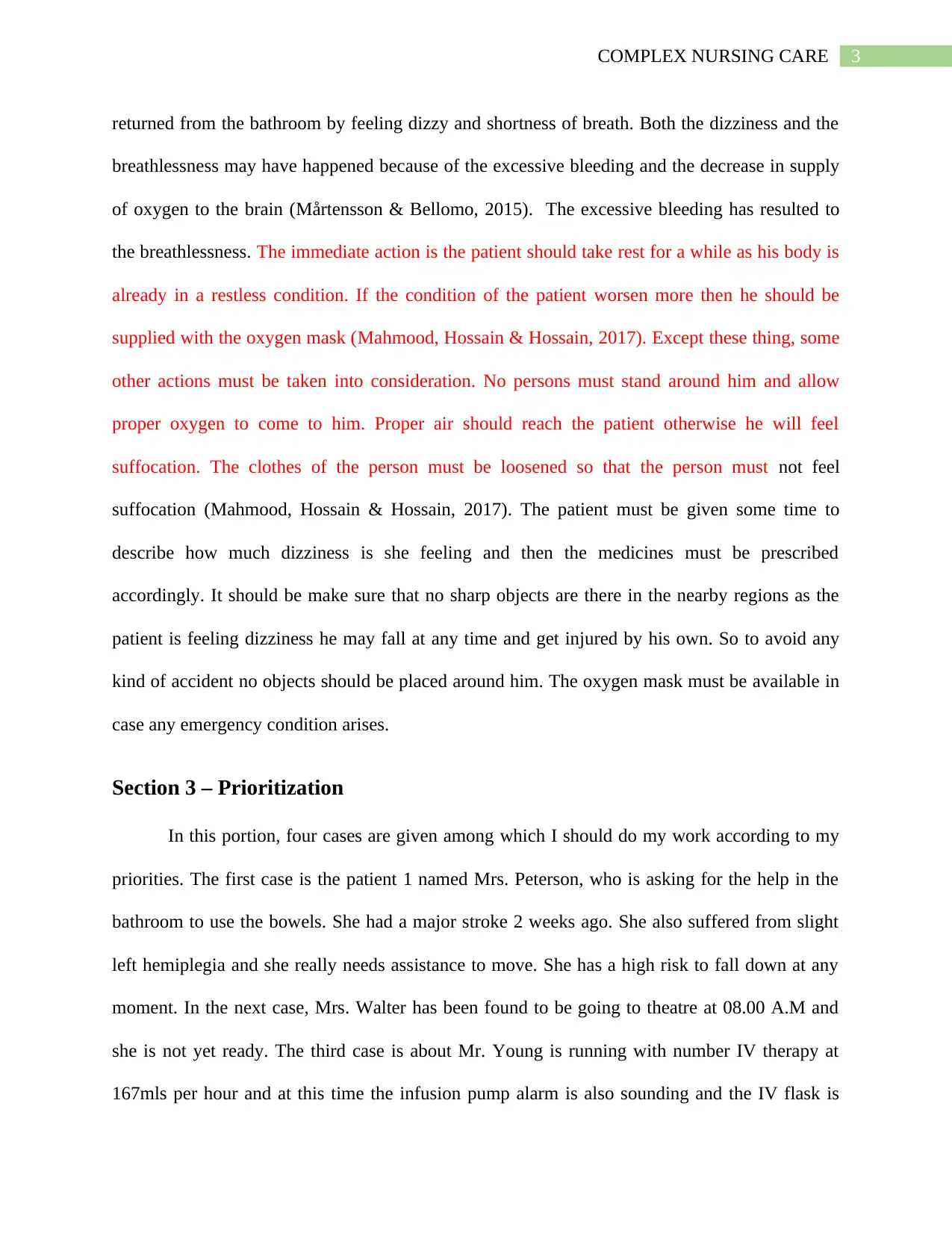
3COMPLEX NURSING CARE
returned from the bathroom by feeling dizzy and shortness of breath. Both the dizziness and the
breathlessness may have happened because of the excessive bleeding and the decrease in supply
of oxygen to the brain (Mårtensson & Bellomo, 2015). The excessive bleeding has resulted to
the breathlessness. The immediate action is the patient should take rest for a while as his body is
already in a restless condition. If the condition of the patient worsen more then he should be
supplied with the oxygen mask (Mahmood, Hossain & Hossain, 2017). Except these thing, some
other actions must be taken into consideration. No persons must stand around him and allow
proper oxygen to come to him. Proper air should reach the patient otherwise he will feel
suffocation. The clothes of the person must be loosened so that the person must not feel
suffocation (Mahmood, Hossain & Hossain, 2017). The patient must be given some time to
describe how much dizziness is she feeling and then the medicines must be prescribed
accordingly. It should be make sure that no sharp objects are there in the nearby regions as the
patient is feeling dizziness he may fall at any time and get injured by his own. So to avoid any
kind of accident no objects should be placed around him. The oxygen mask must be available in
case any emergency condition arises.
Section 3 – Prioritization
In this portion, four cases are given among which I should do my work according to my
priorities. The first case is the patient 1 named Mrs. Peterson, who is asking for the help in the
bathroom to use the bowels. She had a major stroke 2 weeks ago. She also suffered from slight
left hemiplegia and she really needs assistance to move. She has a high risk to fall down at any
moment. In the next case, Mrs. Walter has been found to be going to theatre at 08.00 A.M and
she is not yet ready. The third case is about Mr. Young is running with number IV therapy at
167mls per hour and at this time the infusion pump alarm is also sounding and the IV flask is
returned from the bathroom by feeling dizzy and shortness of breath. Both the dizziness and the
breathlessness may have happened because of the excessive bleeding and the decrease in supply
of oxygen to the brain (Mårtensson & Bellomo, 2015). The excessive bleeding has resulted to
the breathlessness. The immediate action is the patient should take rest for a while as his body is
already in a restless condition. If the condition of the patient worsen more then he should be
supplied with the oxygen mask (Mahmood, Hossain & Hossain, 2017). Except these thing, some
other actions must be taken into consideration. No persons must stand around him and allow
proper oxygen to come to him. Proper air should reach the patient otherwise he will feel
suffocation. The clothes of the person must be loosened so that the person must not feel
suffocation (Mahmood, Hossain & Hossain, 2017). The patient must be given some time to
describe how much dizziness is she feeling and then the medicines must be prescribed
accordingly. It should be make sure that no sharp objects are there in the nearby regions as the
patient is feeling dizziness he may fall at any time and get injured by his own. So to avoid any
kind of accident no objects should be placed around him. The oxygen mask must be available in
case any emergency condition arises.
Section 3 – Prioritization
In this portion, four cases are given among which I should do my work according to my
priorities. The first case is the patient 1 named Mrs. Peterson, who is asking for the help in the
bathroom to use the bowels. She had a major stroke 2 weeks ago. She also suffered from slight
left hemiplegia and she really needs assistance to move. She has a high risk to fall down at any
moment. In the next case, Mrs. Walter has been found to be going to theatre at 08.00 A.M and
she is not yet ready. The third case is about Mr. Young is running with number IV therapy at
167mls per hour and at this time the infusion pump alarm is also sounding and the IV flask is
Paraphrase This Document
Need a fresh take? Get an instant paraphrase of this document with our AI Paraphraser
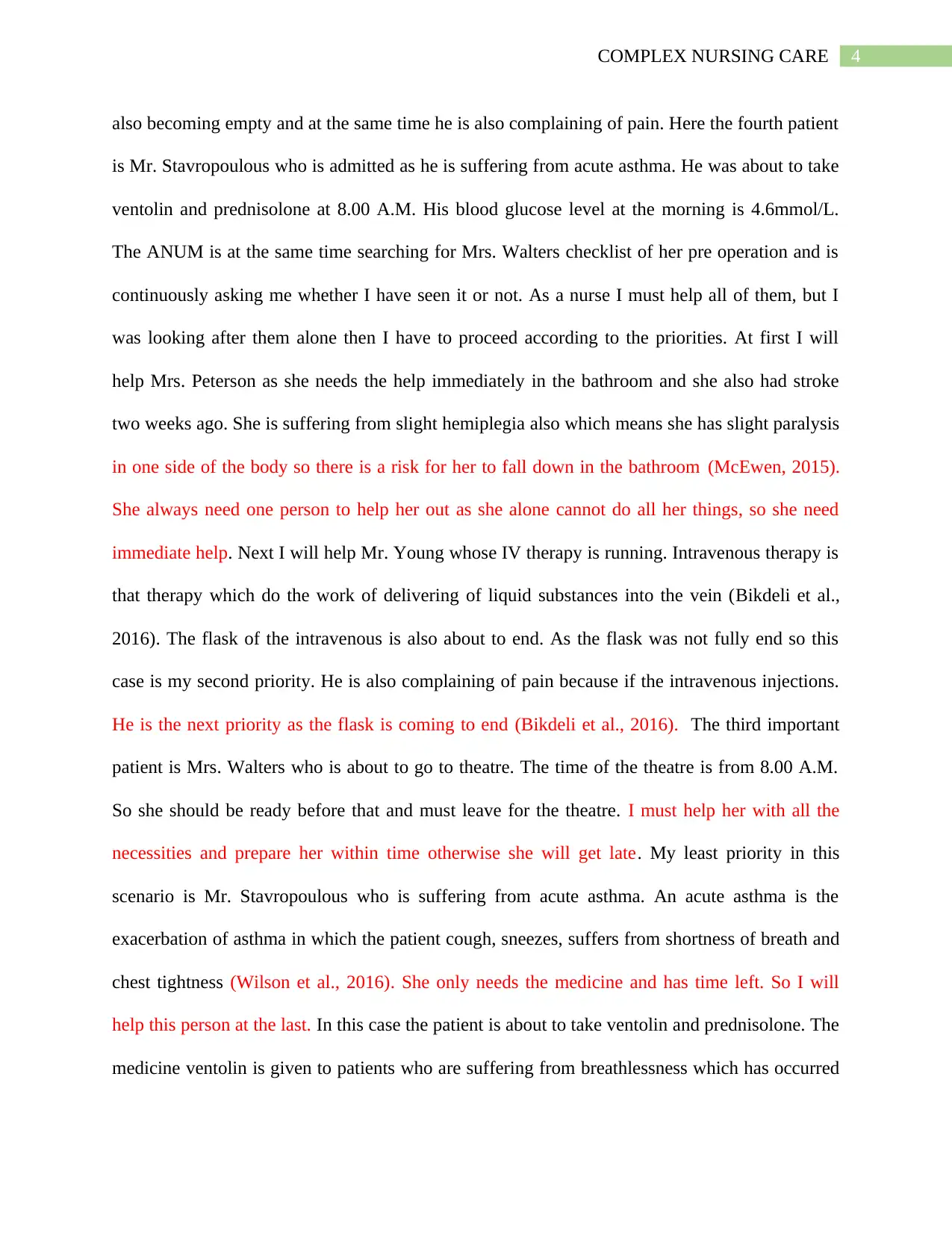
4COMPLEX NURSING CARE
also becoming empty and at the same time he is also complaining of pain. Here the fourth patient
is Mr. Stavropoulous who is admitted as he is suffering from acute asthma. He was about to take
ventolin and prednisolone at 8.00 A.M. His blood glucose level at the morning is 4.6mmol/L.
The ANUM is at the same time searching for Mrs. Walters checklist of her pre operation and is
continuously asking me whether I have seen it or not. As a nurse I must help all of them, but I
was looking after them alone then I have to proceed according to the priorities. At first I will
help Mrs. Peterson as she needs the help immediately in the bathroom and she also had stroke
two weeks ago. She is suffering from slight hemiplegia also which means she has slight paralysis
in one side of the body so there is a risk for her to fall down in the bathroom (McEwen, 2015).
She always need one person to help her out as she alone cannot do all her things, so she need
immediate help. Next I will help Mr. Young whose IV therapy is running. Intravenous therapy is
that therapy which do the work of delivering of liquid substances into the vein (Bikdeli et al.,
2016). The flask of the intravenous is also about to end. As the flask was not fully end so this
case is my second priority. He is also complaining of pain because if the intravenous injections.
He is the next priority as the flask is coming to end (Bikdeli et al., 2016). The third important
patient is Mrs. Walters who is about to go to theatre. The time of the theatre is from 8.00 A.M.
So she should be ready before that and must leave for the theatre. I must help her with all the
necessities and prepare her within time otherwise she will get late. My least priority in this
scenario is Mr. Stavropoulous who is suffering from acute asthma. An acute asthma is the
exacerbation of asthma in which the patient cough, sneezes, suffers from shortness of breath and
chest tightness (Wilson et al., 2016). She only needs the medicine and has time left. So I will
help this person at the last. In this case the patient is about to take ventolin and prednisolone. The
medicine ventolin is given to patients who are suffering from breathlessness which has occurred
also becoming empty and at the same time he is also complaining of pain. Here the fourth patient
is Mr. Stavropoulous who is admitted as he is suffering from acute asthma. He was about to take
ventolin and prednisolone at 8.00 A.M. His blood glucose level at the morning is 4.6mmol/L.
The ANUM is at the same time searching for Mrs. Walters checklist of her pre operation and is
continuously asking me whether I have seen it or not. As a nurse I must help all of them, but I
was looking after them alone then I have to proceed according to the priorities. At first I will
help Mrs. Peterson as she needs the help immediately in the bathroom and she also had stroke
two weeks ago. She is suffering from slight hemiplegia also which means she has slight paralysis
in one side of the body so there is a risk for her to fall down in the bathroom (McEwen, 2015).
She always need one person to help her out as she alone cannot do all her things, so she need
immediate help. Next I will help Mr. Young whose IV therapy is running. Intravenous therapy is
that therapy which do the work of delivering of liquid substances into the vein (Bikdeli et al.,
2016). The flask of the intravenous is also about to end. As the flask was not fully end so this
case is my second priority. He is also complaining of pain because if the intravenous injections.
He is the next priority as the flask is coming to end (Bikdeli et al., 2016). The third important
patient is Mrs. Walters who is about to go to theatre. The time of the theatre is from 8.00 A.M.
So she should be ready before that and must leave for the theatre. I must help her with all the
necessities and prepare her within time otherwise she will get late. My least priority in this
scenario is Mr. Stavropoulous who is suffering from acute asthma. An acute asthma is the
exacerbation of asthma in which the patient cough, sneezes, suffers from shortness of breath and
chest tightness (Wilson et al., 2016). She only needs the medicine and has time left. So I will
help this person at the last. In this case the patient is about to take ventolin and prednisolone. The
medicine ventolin is given to patients who are suffering from breathlessness which has occurred
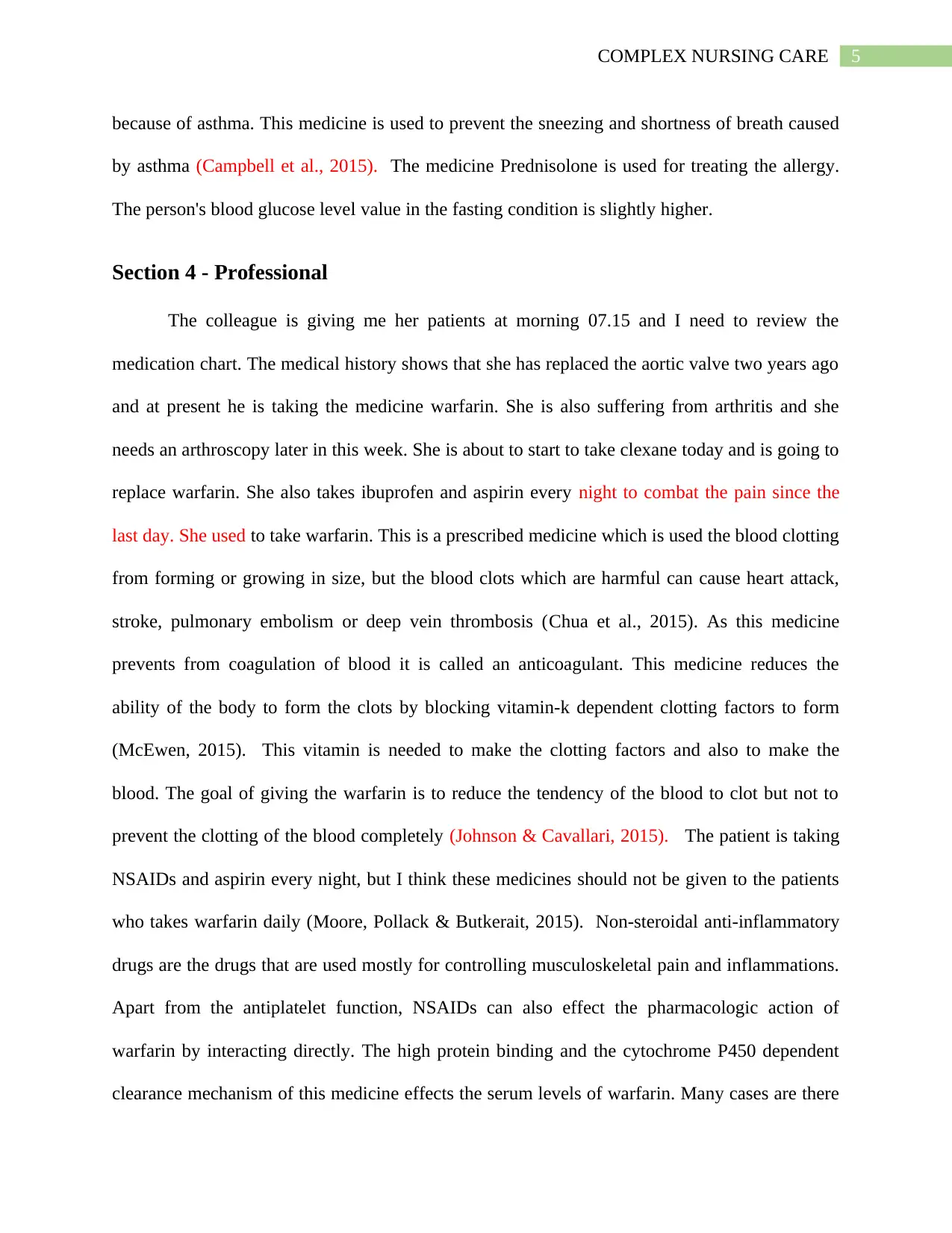
5COMPLEX NURSING CARE
because of asthma. This medicine is used to prevent the sneezing and shortness of breath caused
by asthma (Campbell et al., 2015). The medicine Prednisolone is used for treating the allergy.
The person's blood glucose level value in the fasting condition is slightly higher.
Section 4 - Professional
The colleague is giving me her patients at morning 07.15 and I need to review the
medication chart. The medical history shows that she has replaced the aortic valve two years ago
and at present he is taking the medicine warfarin. She is also suffering from arthritis and she
needs an arthroscopy later in this week. She is about to start to take clexane today and is going to
replace warfarin. She also takes ibuprofen and aspirin every night to combat the pain since the
last day. She used to take warfarin. This is a prescribed medicine which is used the blood clotting
from forming or growing in size, but the blood clots which are harmful can cause heart attack,
stroke, pulmonary embolism or deep vein thrombosis (Chua et al., 2015). As this medicine
prevents from coagulation of blood it is called an anticoagulant. This medicine reduces the
ability of the body to form the clots by blocking vitamin-k dependent clotting factors to form
(McEwen, 2015). This vitamin is needed to make the clotting factors and also to make the
blood. The goal of giving the warfarin is to reduce the tendency of the blood to clot but not to
prevent the clotting of the blood completely (Johnson & Cavallari, 2015). The patient is taking
NSAIDs and aspirin every night, but I think these medicines should not be given to the patients
who takes warfarin daily (Moore, Pollack & Butkerait, 2015). Non-steroidal anti-inflammatory
drugs are the drugs that are used mostly for controlling musculoskeletal pain and inflammations.
Apart from the antiplatelet function, NSAIDs can also effect the pharmacologic action of
warfarin by interacting directly. The high protein binding and the cytochrome P450 dependent
clearance mechanism of this medicine effects the serum levels of warfarin. Many cases are there
because of asthma. This medicine is used to prevent the sneezing and shortness of breath caused
by asthma (Campbell et al., 2015). The medicine Prednisolone is used for treating the allergy.
The person's blood glucose level value in the fasting condition is slightly higher.
Section 4 - Professional
The colleague is giving me her patients at morning 07.15 and I need to review the
medication chart. The medical history shows that she has replaced the aortic valve two years ago
and at present he is taking the medicine warfarin. She is also suffering from arthritis and she
needs an arthroscopy later in this week. She is about to start to take clexane today and is going to
replace warfarin. She also takes ibuprofen and aspirin every night to combat the pain since the
last day. She used to take warfarin. This is a prescribed medicine which is used the blood clotting
from forming or growing in size, but the blood clots which are harmful can cause heart attack,
stroke, pulmonary embolism or deep vein thrombosis (Chua et al., 2015). As this medicine
prevents from coagulation of blood it is called an anticoagulant. This medicine reduces the
ability of the body to form the clots by blocking vitamin-k dependent clotting factors to form
(McEwen, 2015). This vitamin is needed to make the clotting factors and also to make the
blood. The goal of giving the warfarin is to reduce the tendency of the blood to clot but not to
prevent the clotting of the blood completely (Johnson & Cavallari, 2015). The patient is taking
NSAIDs and aspirin every night, but I think these medicines should not be given to the patients
who takes warfarin daily (Moore, Pollack & Butkerait, 2015). Non-steroidal anti-inflammatory
drugs are the drugs that are used mostly for controlling musculoskeletal pain and inflammations.
Apart from the antiplatelet function, NSAIDs can also effect the pharmacologic action of
warfarin by interacting directly. The high protein binding and the cytochrome P450 dependent
clearance mechanism of this medicine effects the serum levels of warfarin. Many cases are there
⊘ This is a preview!⊘
Do you want full access?
Subscribe today to unlock all pages.

Trusted by 1+ million students worldwide
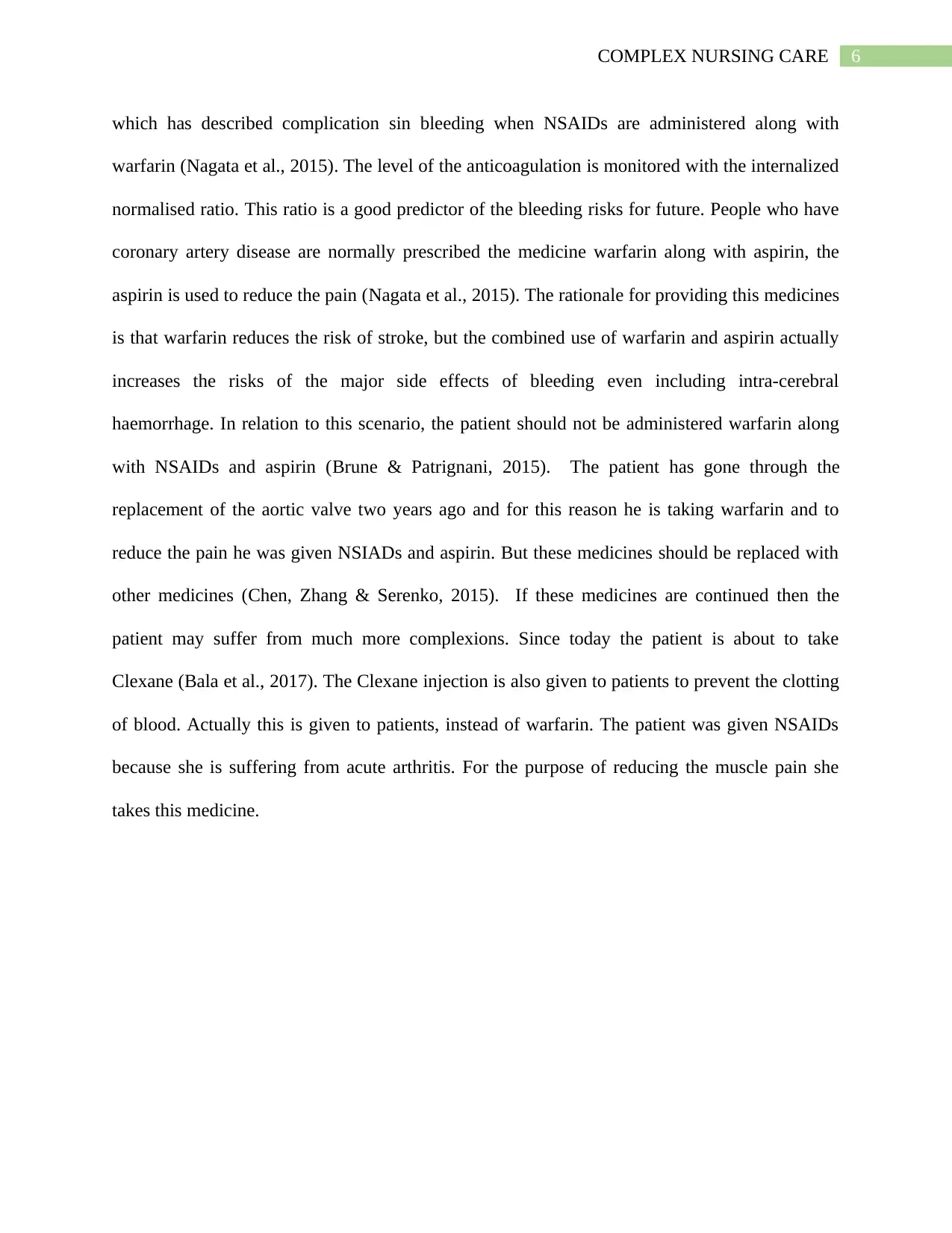
6COMPLEX NURSING CARE
which has described complication sin bleeding when NSAIDs are administered along with
warfarin (Nagata et al., 2015). The level of the anticoagulation is monitored with the internalized
normalised ratio. This ratio is a good predictor of the bleeding risks for future. People who have
coronary artery disease are normally prescribed the medicine warfarin along with aspirin, the
aspirin is used to reduce the pain (Nagata et al., 2015). The rationale for providing this medicines
is that warfarin reduces the risk of stroke, but the combined use of warfarin and aspirin actually
increases the risks of the major side effects of bleeding even including intra-cerebral
haemorrhage. In relation to this scenario, the patient should not be administered warfarin along
with NSAIDs and aspirin (Brune & Patrignani, 2015). The patient has gone through the
replacement of the aortic valve two years ago and for this reason he is taking warfarin and to
reduce the pain he was given NSIADs and aspirin. But these medicines should be replaced with
other medicines (Chen, Zhang & Serenko, 2015). If these medicines are continued then the
patient may suffer from much more complexions. Since today the patient is about to take
Clexane (Bala et al., 2017). The Clexane injection is also given to patients to prevent the clotting
of blood. Actually this is given to patients, instead of warfarin. The patient was given NSAIDs
because she is suffering from acute arthritis. For the purpose of reducing the muscle pain she
takes this medicine.
which has described complication sin bleeding when NSAIDs are administered along with
warfarin (Nagata et al., 2015). The level of the anticoagulation is monitored with the internalized
normalised ratio. This ratio is a good predictor of the bleeding risks for future. People who have
coronary artery disease are normally prescribed the medicine warfarin along with aspirin, the
aspirin is used to reduce the pain (Nagata et al., 2015). The rationale for providing this medicines
is that warfarin reduces the risk of stroke, but the combined use of warfarin and aspirin actually
increases the risks of the major side effects of bleeding even including intra-cerebral
haemorrhage. In relation to this scenario, the patient should not be administered warfarin along
with NSAIDs and aspirin (Brune & Patrignani, 2015). The patient has gone through the
replacement of the aortic valve two years ago and for this reason he is taking warfarin and to
reduce the pain he was given NSIADs and aspirin. But these medicines should be replaced with
other medicines (Chen, Zhang & Serenko, 2015). If these medicines are continued then the
patient may suffer from much more complexions. Since today the patient is about to take
Clexane (Bala et al., 2017). The Clexane injection is also given to patients to prevent the clotting
of blood. Actually this is given to patients, instead of warfarin. The patient was given NSAIDs
because she is suffering from acute arthritis. For the purpose of reducing the muscle pain she
takes this medicine.
Paraphrase This Document
Need a fresh take? Get an instant paraphrase of this document with our AI Paraphraser
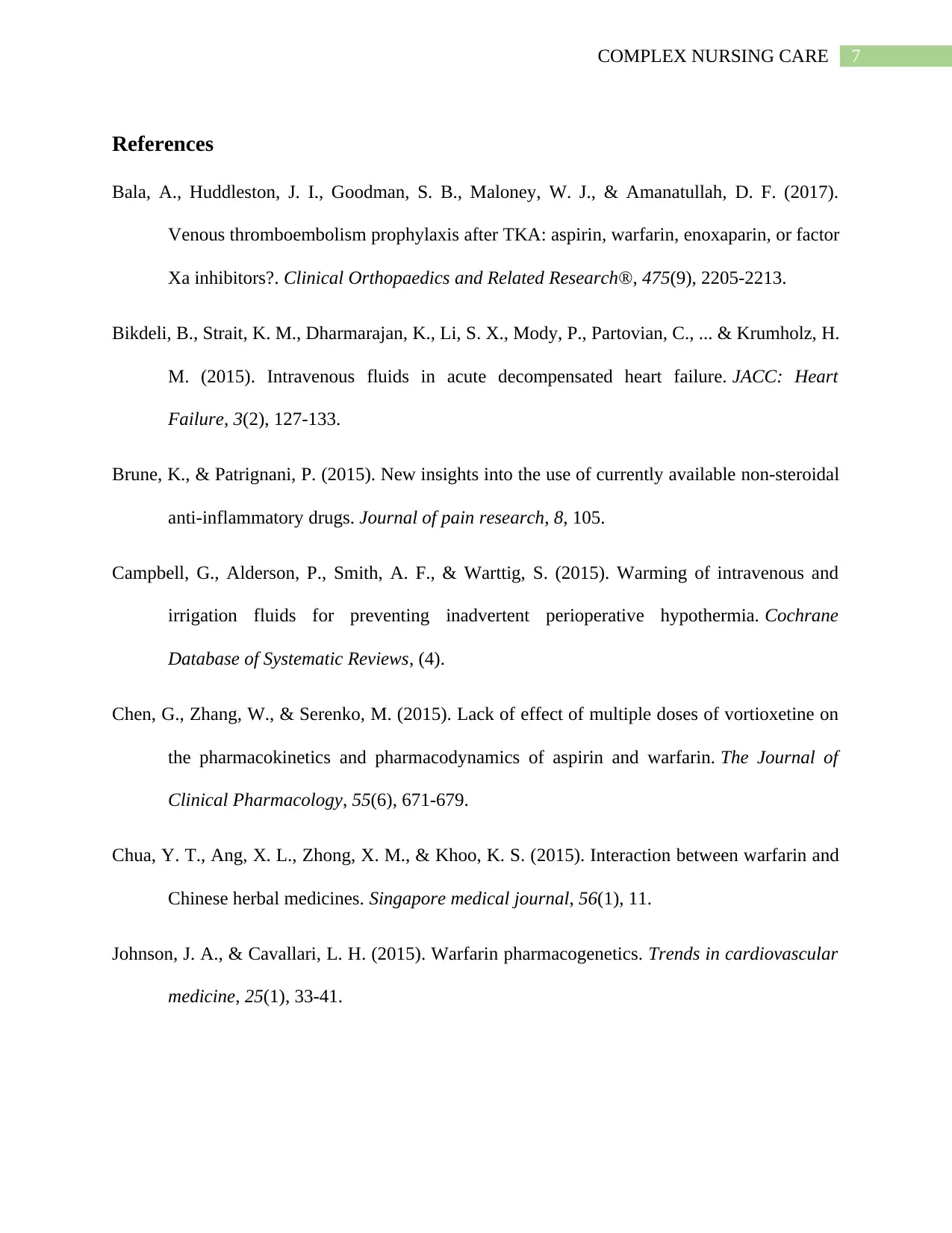
7COMPLEX NURSING CARE
References
Bala, A., Huddleston, J. I., Goodman, S. B., Maloney, W. J., & Amanatullah, D. F. (2017).
Venous thromboembolism prophylaxis after TKA: aspirin, warfarin, enoxaparin, or factor
Xa inhibitors?. Clinical Orthopaedics and Related Research®, 475(9), 2205-2213.
Bikdeli, B., Strait, K. M., Dharmarajan, K., Li, S. X., Mody, P., Partovian, C., ... & Krumholz, H.
M. (2015). Intravenous fluids in acute decompensated heart failure. JACC: Heart
Failure, 3(2), 127-133.
Brune, K., & Patrignani, P. (2015). New insights into the use of currently available non-steroidal
anti-inflammatory drugs. Journal of pain research, 8, 105.
Campbell, G., Alderson, P., Smith, A. F., & Warttig, S. (2015). Warming of intravenous and
irrigation fluids for preventing inadvertent perioperative hypothermia. Cochrane
Database of Systematic Reviews, (4).
Chen, G., Zhang, W., & Serenko, M. (2015). Lack of effect of multiple doses of vortioxetine on
the pharmacokinetics and pharmacodynamics of aspirin and warfarin. The Journal of
Clinical Pharmacology, 55(6), 671-679.
Chua, Y. T., Ang, X. L., Zhong, X. M., & Khoo, K. S. (2015). Interaction between warfarin and
Chinese herbal medicines. Singapore medical journal, 56(1), 11.
Johnson, J. A., & Cavallari, L. H. (2015). Warfarin pharmacogenetics. Trends in cardiovascular
medicine, 25(1), 33-41.
References
Bala, A., Huddleston, J. I., Goodman, S. B., Maloney, W. J., & Amanatullah, D. F. (2017).
Venous thromboembolism prophylaxis after TKA: aspirin, warfarin, enoxaparin, or factor
Xa inhibitors?. Clinical Orthopaedics and Related Research®, 475(9), 2205-2213.
Bikdeli, B., Strait, K. M., Dharmarajan, K., Li, S. X., Mody, P., Partovian, C., ... & Krumholz, H.
M. (2015). Intravenous fluids in acute decompensated heart failure. JACC: Heart
Failure, 3(2), 127-133.
Brune, K., & Patrignani, P. (2015). New insights into the use of currently available non-steroidal
anti-inflammatory drugs. Journal of pain research, 8, 105.
Campbell, G., Alderson, P., Smith, A. F., & Warttig, S. (2015). Warming of intravenous and
irrigation fluids for preventing inadvertent perioperative hypothermia. Cochrane
Database of Systematic Reviews, (4).
Chen, G., Zhang, W., & Serenko, M. (2015). Lack of effect of multiple doses of vortioxetine on
the pharmacokinetics and pharmacodynamics of aspirin and warfarin. The Journal of
Clinical Pharmacology, 55(6), 671-679.
Chua, Y. T., Ang, X. L., Zhong, X. M., & Khoo, K. S. (2015). Interaction between warfarin and
Chinese herbal medicines. Singapore medical journal, 56(1), 11.
Johnson, J. A., & Cavallari, L. H. (2015). Warfarin pharmacogenetics. Trends in cardiovascular
medicine, 25(1), 33-41.
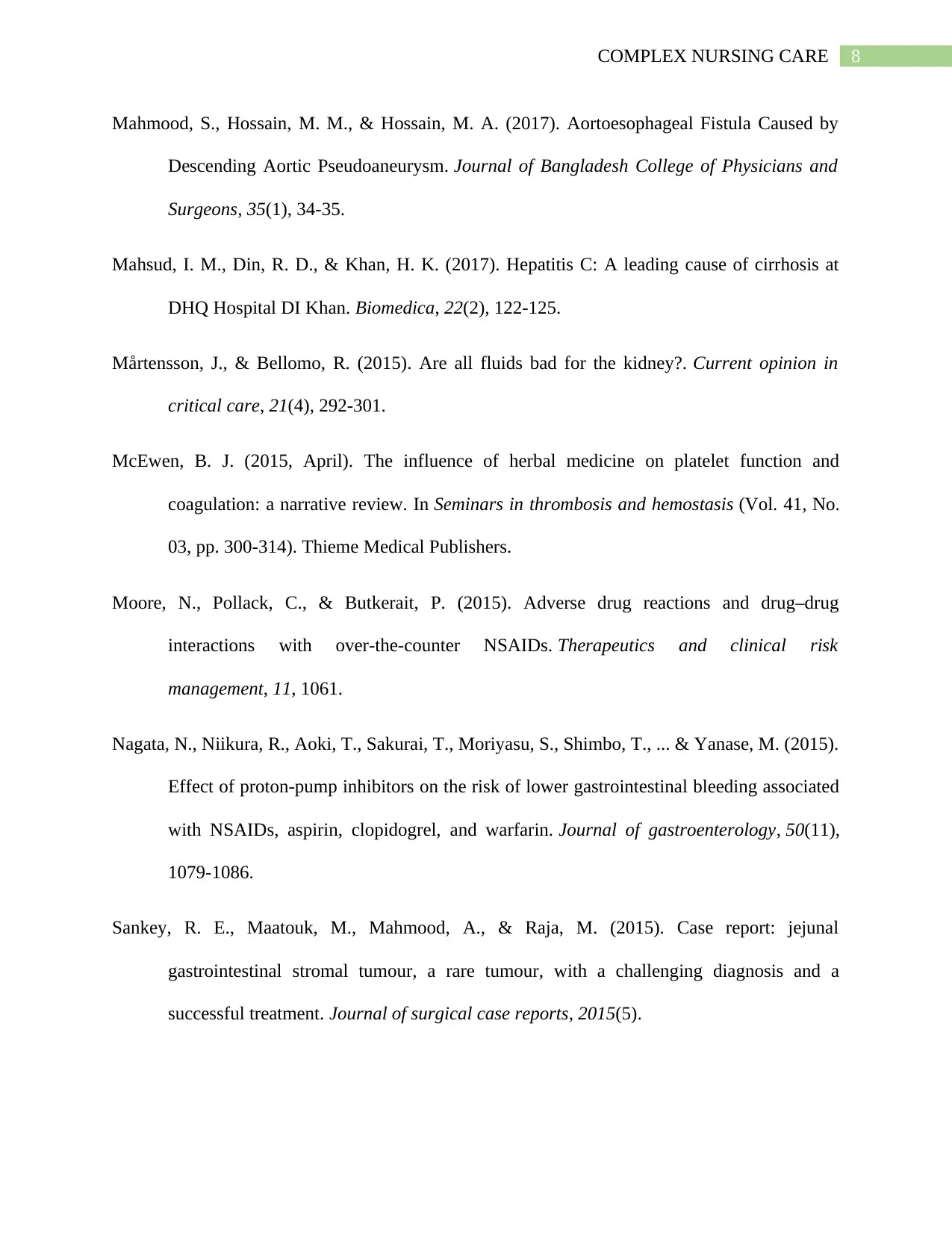
8COMPLEX NURSING CARE
Mahmood, S., Hossain, M. M., & Hossain, M. A. (2017). Aortoesophageal Fistula Caused by
Descending Aortic Pseudoaneurysm. Journal of Bangladesh College of Physicians and
Surgeons, 35(1), 34-35.
Mahsud, I. M., Din, R. D., & Khan, H. K. (2017). Hepatitis C: A leading cause of cirrhosis at
DHQ Hospital DI Khan. Biomedica, 22(2), 122-125.
Mårtensson, J., & Bellomo, R. (2015). Are all fluids bad for the kidney?. Current opinion in
critical care, 21(4), 292-301.
McEwen, B. J. (2015, April). The influence of herbal medicine on platelet function and
coagulation: a narrative review. In Seminars in thrombosis and hemostasis (Vol. 41, No.
03, pp. 300-314). Thieme Medical Publishers.
Moore, N., Pollack, C., & Butkerait, P. (2015). Adverse drug reactions and drug–drug
interactions with over-the-counter NSAIDs. Therapeutics and clinical risk
management, 11, 1061.
Nagata, N., Niikura, R., Aoki, T., Sakurai, T., Moriyasu, S., Shimbo, T., ... & Yanase, M. (2015).
Effect of proton-pump inhibitors on the risk of lower gastrointestinal bleeding associated
with NSAIDs, aspirin, clopidogrel, and warfarin. Journal of gastroenterology, 50(11),
1079-1086.
Sankey, R. E., Maatouk, M., Mahmood, A., & Raja, M. (2015). Case report: jejunal
gastrointestinal stromal tumour, a rare tumour, with a challenging diagnosis and a
successful treatment. Journal of surgical case reports, 2015(5).
Mahmood, S., Hossain, M. M., & Hossain, M. A. (2017). Aortoesophageal Fistula Caused by
Descending Aortic Pseudoaneurysm. Journal of Bangladesh College of Physicians and
Surgeons, 35(1), 34-35.
Mahsud, I. M., Din, R. D., & Khan, H. K. (2017). Hepatitis C: A leading cause of cirrhosis at
DHQ Hospital DI Khan. Biomedica, 22(2), 122-125.
Mårtensson, J., & Bellomo, R. (2015). Are all fluids bad for the kidney?. Current opinion in
critical care, 21(4), 292-301.
McEwen, B. J. (2015, April). The influence of herbal medicine on platelet function and
coagulation: a narrative review. In Seminars in thrombosis and hemostasis (Vol. 41, No.
03, pp. 300-314). Thieme Medical Publishers.
Moore, N., Pollack, C., & Butkerait, P. (2015). Adverse drug reactions and drug–drug
interactions with over-the-counter NSAIDs. Therapeutics and clinical risk
management, 11, 1061.
Nagata, N., Niikura, R., Aoki, T., Sakurai, T., Moriyasu, S., Shimbo, T., ... & Yanase, M. (2015).
Effect of proton-pump inhibitors on the risk of lower gastrointestinal bleeding associated
with NSAIDs, aspirin, clopidogrel, and warfarin. Journal of gastroenterology, 50(11),
1079-1086.
Sankey, R. E., Maatouk, M., Mahmood, A., & Raja, M. (2015). Case report: jejunal
gastrointestinal stromal tumour, a rare tumour, with a challenging diagnosis and a
successful treatment. Journal of surgical case reports, 2015(5).
⊘ This is a preview!⊘
Do you want full access?
Subscribe today to unlock all pages.

Trusted by 1+ million students worldwide
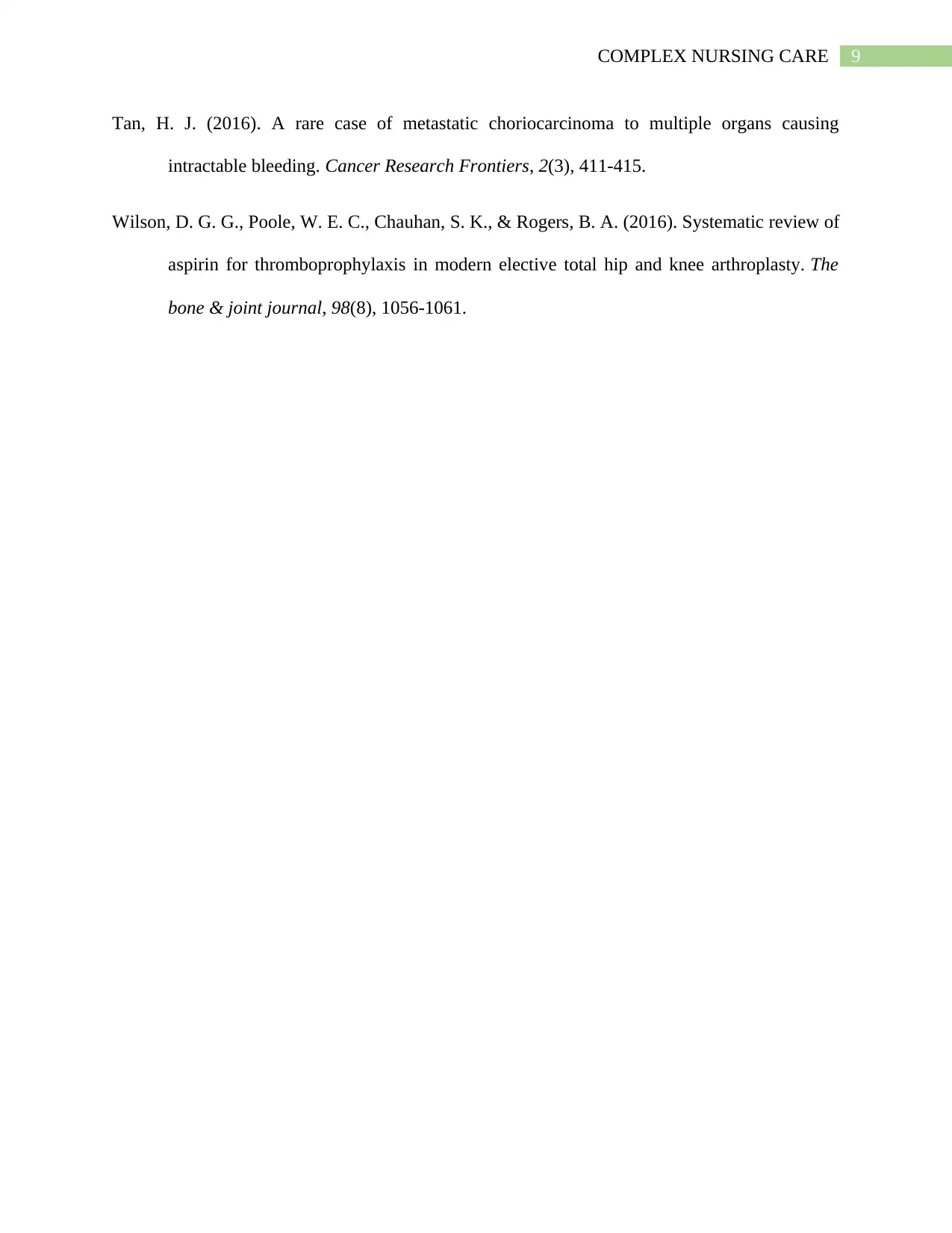
9COMPLEX NURSING CARE
Tan, H. J. (2016). A rare case of metastatic choriocarcinoma to multiple organs causing
intractable bleeding. Cancer Research Frontiers, 2(3), 411-415.
Wilson, D. G. G., Poole, W. E. C., Chauhan, S. K., & Rogers, B. A. (2016). Systematic review of
aspirin for thromboprophylaxis in modern elective total hip and knee arthroplasty. The
bone & joint journal, 98(8), 1056-1061.
Tan, H. J. (2016). A rare case of metastatic choriocarcinoma to multiple organs causing
intractable bleeding. Cancer Research Frontiers, 2(3), 411-415.
Wilson, D. G. G., Poole, W. E. C., Chauhan, S. K., & Rogers, B. A. (2016). Systematic review of
aspirin for thromboprophylaxis in modern elective total hip and knee arthroplasty. The
bone & joint journal, 98(8), 1056-1061.
1 out of 10
Related Documents
Your All-in-One AI-Powered Toolkit for Academic Success.
+13062052269
info@desklib.com
Available 24*7 on WhatsApp / Email
![[object Object]](/_next/static/media/star-bottom.7253800d.svg)
Unlock your academic potential
Copyright © 2020–2025 A2Z Services. All Rights Reserved. Developed and managed by ZUCOL.





